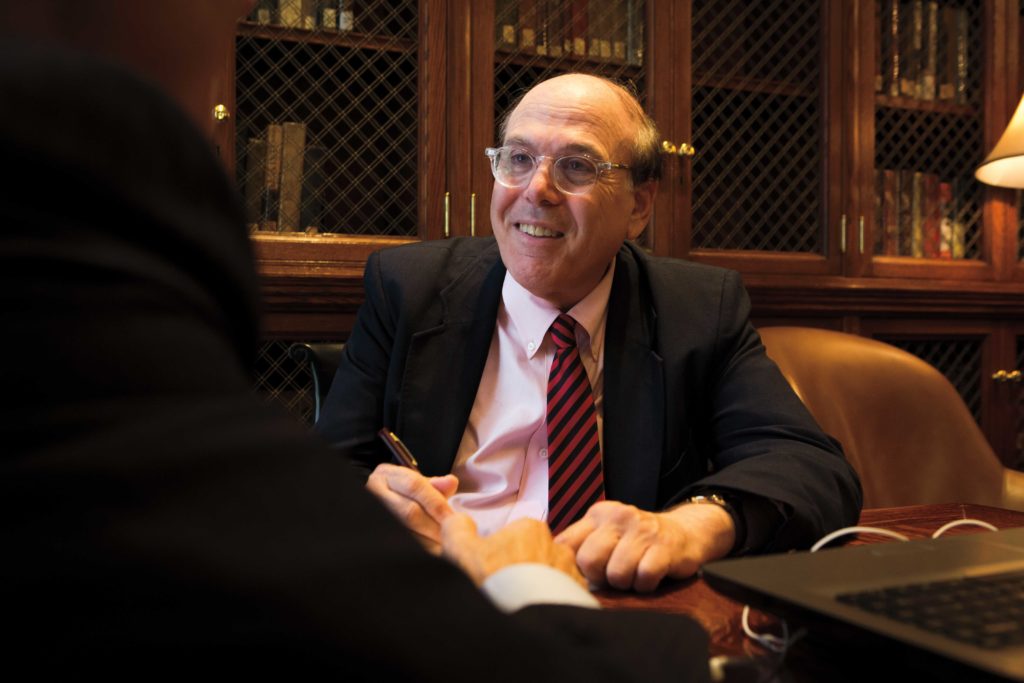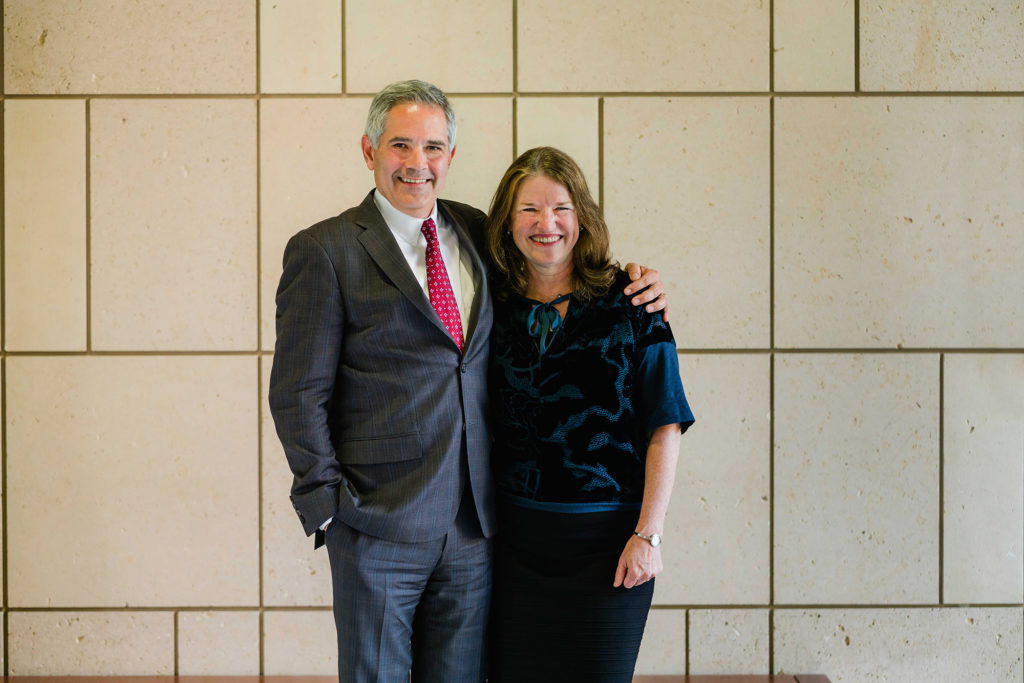The Run for Office: JDs in Politics

As a political neophyte running for city council in her adopted hometown of Palm Springs, California, Christy Holstege, JD ’12, has had to come to grips with some hard political truths.
There’s the mind-boggling amount of money that needs to be raised to cover campaign costs. There’s the lack of name recognition that comes with being a first-time candidate. There’s the blowback, when you are a millennial running in a desert resort city, a retirement haven where people opposing you have more than a little time on their hands.
“Ultimately, I saw other people running and I said, ‘I can do what that person is doing,’ ” Holstege, 31, says, undaunted. “I just threw myself in. I’m taking it step-by-step. I’ve been figuring it out as I go.”
So far, that means plumbing a network of supporters that includes more than a few law school classmates, borrowing a tech-savvy brother-in-law to design the campaign website, and fighting a ground war by knocking on doors and sticking to the issues.
For many years, SLS graduates have confronted these and other realities of the political process. On the local, state, and national levels, they have occupied positions of power and influence in government, as lawmakers, advisors, and counselors.
“Lawyers make great leaders. Service to others is central to our profession, and the ideal elected official views her job to be speaking and advocating for others. Lawyers also understand in their bones the centrality of rule of law and fair governance. We work hard at Stanford to foster that culture of service and to offer the tools our graduates need for leadership,” says M. Elizabeth Magill, Richard E. Lang Professor of Law and Dean, noting that just last year a new student group, Women in Politics, launched. “I am deeply gratified that more students seem to be hearing the call.”
“We certainly think of running for elected office as among the most important aspects of public service,” says Diane Chin, associate dean for public service and public interest law.“ Lawyers can bring a distinct perspective to that kind of service in government.” Now, a new generation of candidates is looking at taking the plunge, with a new and powerful impetus coming from last November’s presidential election. Across the country, thousands of political newcomers are considering elected office for the first time.
OVER THE YEARS, CHIN, WHO OVERSEES THE John and Terry Levin Center for Public Service and Public Interest Law’s career development, pro bono, externship, and mentoring programs, has counseled students interested in learning more about running for office or getting involved in political campaigns—and she has observed that interest recently has intensified.
“Politics is not a field that can be outsourced. You have to pick where you want to be and when you do, just dive in.”
––Matt Platkin, JD ’14 (BA ’09), who has worked on several political campaigns
In February, the Levin Center co-sponsored a two-day Primer on How to Run for Elected Office, which drew more than 100 students and alumni. The program featured politically active law graduates discussing their career paths along with training in the nuts and bolts of giving a stump speech or asking people for campaign contributions.
For many, politics remains a kind of “black box” where the logistics of deciding whether to run, building an organization, developing a message, and soliciting support are far from obvious. For all the good that law schools do, launching a political career is not necessarily a strong suit.
“There’s no application process, no on-campus recruiting, no clerkship process for getting involved in politics,” says Matt Platkin, JD ’14 (BA ’09), who helped organize the February program. “I have conversations all the time where people say ‘How do I get involved? I don’t know what to do. What is the first step?’ ”
For Platkin, that came when his best friend from undergraduate days at Stanford mentioned he was contemplating going home to San Antonio, Texas, and running for city council. With no experience, Platkin volunteered to be campaign manager, and the friend won—big. During law school, Platkin, a New Jersey native, had worked on Cory Booker’s successful U.S. Senate campaign, and a year after graduating he was introduced to Phil Murphy, a former Goldman Sachs executive and U.S. ambassador to Germany, who was considering a run for governor. Platkin is now policy director for Murphy, the Democratic nominee to succeed outgoing Governor Chris Christie in November.
“Politics is not a field that can be outsourced,” Platkin says. “You have to pick where you want to be and when you do, just dive in.”
Jeff Bingaman, JD ’68, says as a young man he was inspired by the war stories of an uncle who managed the campaign of an earlier U.S. senator from New Mexico. During law school, Bingaman remembers doing volunteer work on Robert F. Kennedy’s campaign during the Democratic presidential primary in California. When Kennedy aide and speechwriter Arthur Schlesinger, Jr., visited the Stanford campus to speak on the candidate’s behalf, it was Bingaman’s job to pick him up at the airport. “I felt sure that Robert Kennedy was on his way to being president,” Bingaman says.
Oakland lawyer Robin Johansen, JD ’77, worked as a research assistant on the House Judiciary Committee when it was investigating the Watergate break-in and overseeing the impeachment process that led Richard Nixon to resign. She took the job thinking she would later go to law school and use her degree to become a political consultant. But the experience of watching history in the making changed her mind.
“Once I got there and saw the quality of the lawyers I was working with and what they did, it was just an eye-opener and I decided I was going to go to law school for real. I wanted to be like them,” says Johansen. She later founded a law firm in Oakland that has become one of the elite political law firms in the state, writing ballot initiatives, advising candidates on campaign finance, and litigating re-districting and other cases.
Josh Bolten, JD ‘80, who served George W. Bush as OMB director and White House chief of staff, grew up in Washington, D.C., where his father was a career employee of the Central Intelligence Agency. “I always thought the most likely career path for me was to go to law school and then have one of those mixed law and government careers like some friends of my parents whom I admired, and that is basically what I did,” says Bolten, who also served as general counsel to the U.S. trade representative under George H.W. Bush. “We are a company town, and I found I liked the company business.”

LAW SCHOOLS HAVE LONG BEEN TRAINING GROUNDS FOR politicians and other public servants. The analytical and advocacy skills that come with earning a law degree are tailor made for a career in politics or government. By definition, legal training can be a plus where your job is making and interpreting laws, after all.
Bolten, who was policy director of the Bush-Cheney presidential campaign in 2000, says his legal training was even indispensable in that position, which involved organizing issue-oriented briefing sessions for the candidate. “A lawyer’s job is to take a complicated set of facts, figure out which ones are important, and then apply the right principles to come to a sound conclusion, and that’s essentially what my job was. My law school education, I think, was crucial in preparing me for that,” Bolten says, adding that “the most concentrated locus of our best campaign policy advisors was at Stanford.”
Running for office, lawyers face challenges common to all candidates. Most people that run for office the first time, for instance, have very little name recognition. And money, for better or for worse, drives the system, both in garnering attention and paying the bills.
“It doesn’t make you uniquely qualified to run for office because you went to law school or have a law degree. It all depends on what you do with that experience,” says Nicole Derse, a campaign consultant in San Francisco, who ran the training portion of the February running-for-office program. “The most effective candidates are those that understand the issues in the communities they wish to serve and who have a base of support because they have been working to improve peoples’ lives in some way.”
Last fall, Raul Torrez, JD ’05, ran for district attorney in his hometown of Albuquerque, New Mexico, on a platform of reforming the criminal justice system. After law school, he had spent several years as an assistant prosecutor in the state, often frustrated with the focus on locking up non-violent offenders.
BUT AS A FIRST-TIME CANDIDATE, AGAINST AN INCUMBENT FLUSH WITH CASH, he soon realized he did not have a chance without a war chest of his own. So, for several hours each day, he sat in a windowless room with a list of names and phone numbers, calling up friends, family, and, frequently, total strangers, asking for support. Most of Torrez’s fundraising calls went straight to voicemail and were never returned. He also reached out to family and friends, though most could only offer words of encouragement. Among those he contacted was his father, a longtime prosecutor and steady source of advice over the years. “I called him up and said, ‘I need to raise $100,000 in three months,’ ” Torrez recalls. “He said, ‘Good luck.’ ”
“It is the most rewarding job I have had in my life. I am working on the most important issues facing the criminal justice system in my own hometown.”
––Raul Torrez, JD ’05, who won his 2016 bid for DA in Albuquerque
More than most candidates, Torrez was prepared for rejection. Before law school, he worked as a development officer for a large nonprofit organization in Los Angeles. “Psychologically, I was used to it,” he says of the ups and downs of fundraising. “I understood it is a process. You cannot take it personally. You just push through it.” His perseverance—and a professional network including not a few SLS classmates—paid off. He more than tripled the amount raised by his opponent and ended up winning in a rout.
“It is the most rewarding job I have had in my life,” Torrez says. “I am working on the most important issues facing the criminal justice system in my own hometown. My office is three blocks from my elementary school and from where my dad has been working for 40 years. I feel this is exactly what I should be doing.”
In New Jersey, Robert Shapiro, JD ’89, is running for state senate on a shoestring—and as a Republican in a Democratic stronghold. But Shapiro hopes his reform-minded message will appeal to voters. Before receiving his law degree, he earned a PhD in American history from Harvard, where his specialty was the Progressive era. Now, he’s leveraging that knowledge, offering himself up to voters as a “Teddy Roosevelt Progressive Republican.”
“I always followed politics from the sidelines, sort of like someone watching baseball,” says Shapiro, who works as a contract attorney and schoolteacher. He decided to get in the game after Representative Anthony Weiner was exposed for sending sexually explicit text messages to women. Shapiro grew up in the Brooklyn neighborhood that Weiner represented in Congress and he attended the same public high school as Senator Chuck Schumer, Senator Bernie Sanders, and U.S. Supreme Court Justice Ruth Bader Ginsburg. Shapiro was disgusted by Weiner’s conduct and saw an opportunity to build on his hometown’s tradition of public service.
In 2012, Shapiro ran as an Independent candidate for Congress in New Jersey, where he has lived since 1994, with a focus on the lingering effects on working-class people of the 2008 financial crisis. Two years later, he ran again, under the slogan “Stop Boss Politics,” opposing the brother of a local Democratic Party leader. In losing causes, he did get some name recognition—and over 1,000 votes.
Then, with Republicans having trouble fielding candidates in solidly Democratic southern New Jersey, and Shapiro having a track record of unabashedly taking them on, he was contacted by a local GOP official and asked to run for state senate. Under the banner of his icon Roosevelt, and with virtually no opposition, he won the Republican primary this past June, without spending a dime.
THE GENERAL ELECTION WILL BE MORE CHALLENGING. Shapiro is promising to root out special interests in state and municipal government. But what he calls the “corrupt do-nothing Democrats” outnumber Republicans in his district by more than two to one. What is more, his opponent has reported $220,000 in campaign contributions from lawyers, lobbyists, and business interests, among others; Shapiro has raised $1,000 from friends.

“My goal is to get every registered Republican and every unaffiliated voter to vote for me,” he says. “That is the only way I can win.”
In Philadelphia, where Larry Krasner, JD ’87, is the Democratic nominee for district attorney, being a lawyer is a required part of the job description. But he says his three decades’ experience as a defense lawyer has been a help beyond just having the credential.
Picking juries and trying cases over the years, he says, have given him “a pretty clear understanding of what Philadelphia voters are about and a pretty good sense of how to communicate with them.”
As a defense lawyer, he has been an agent for nonviolent social change, taking on cases of such groups as Black Lives Matter, Occupy Philadelphia, and Act Up, as well as members of the clergy and hundreds of protesters at the 2000 Republican National Convention. He has sued police officers and law enforcement agencies dozens of times. It turns out that young activists he represented over the years are now in positions of leadership and influence in their communities and able to sway votes.
Krasner has promised to end mass incarceration and never seek the death penalty. His campaign events include a screening of the movie Crown Heights, the story of a man who is wrongly convicted of murder, and a fundraiser this fall at the shuttered Eastern States Penitentiary, which is now a national historic site. The campaign has resonated with voters, especially in the city’s large African-American community. A local African-American attorney well-known for his journalism and legal work—among other things he was instrumental in establishing a slave memorial near Independence Hall—has dubbed Krasner “the blackest white DA candidate ever.”
Krasner is married to Lisa Rau, JD ’87, a judge at the Pennsylvania Court of Common Pleas, who remembers how they put their legal problem-solving skills to work in her first judicial campaign in 1999 and later in 2001 when she won.
“We strategized just as in preparing a case for trial,” Rau says. “You study the facts. You study what you have got going for you, where you are strong, where you are weak. You study whether people are going to be persuaded and, if not, you use your resources elsewhere.”
One thing they discovered was that, in judicial races, most people don’t remember how they voted just five minutes after they cast their ballot. To Rau, that meant it was critical for her campaign workers to buttonhole voters walking into polling places because they probably arrived without knowing whom they were going to support.
“We actually did role playing for how to approach people at the polls,” she says. “It was like a two-minute closing argument.” As part of her pitch in the community, she often reminded people that her name was the shortest name on the ballot to help them remember when they voted.
“I really do believe that most people want to elect a person who would be good for the job,” she says. “So if you believe you would do that job well, then you have to put on your lawyer hat and figure out how to persuade people.”
HOLSTEGE IS BANKING ON THAT. Entering law school, she knew she wanted to one day pursue public service and elected office, from a young age thinking about ways to create change for low-income communities and women, girls, and marginalized groups. Her grandparents lived in public housing, and her mother grew up picking peaches in Yuba City in rural Northern California before becoming the first-generation family member to attend college.
“We actually did role playing for how to approach people at the polls. It was like a two-minute closing argument.”
––Lisa Rau, JD ’87, a judge at the Pennsylvania Court of Common Pleas, about her first judicial campaign
As a law student, Holstege worked at the Stanford Community Law Clinic in East Palo Alto, became an officer in the Stanford Law Association, and launched the Stanford Law Students for Reproductive Justice chapter. She won a post-graduate public interest law fellowship, which she used to establish a legal clinic for battered women in Palm Springs. She later worked as a lawyer for California Rural Legal Assistance, counseling some of the thousands of migrant farm workers living in the greater Coachella Valley. She now works at her husband’s family law firm, representing victims of discrimination and violence and people with disabilities.
While classmates chose major cities to launch public interest careers, Holstege thought she might have a bigger impact working in a smaller community. “There are 400,000 permanent residents in the whole valley, and we have two legal aid attorneys,” she says. “Access to justice is really, really minimal here. It is just non-existent.”
Sooner than Holstege expected, the stars began to align for her politically. The city government was shaken by a corruption scandal that entangled the mayor and some local developers. Several incumbent members of the city council decided not to seek re-election, including the only woman. The election of President Trump cinched the deal. In Holstege’s view, there was a new administration in Washington hostile to the middle class, minorities, and women, and she decided to answer the call.
Hitting the law books again, she studied the California Fair Political Practices Manual, contacted a couple of friends who had run for office previously, and began thinking about how she would raise the $150,000 that advisors told her was needed for a credible run. (The job she is seeking pays $30,000 a year.) In three months, she qualified for the ballot and, through crowd-funding and an email campaign, raised more money than any other candidate.
“People know Christy as someone who deeply cares about things,” says Teddy Kider, JD ’12, a classmate and now associate at Gibson Dunn in Los Angeles who spearheaded a fundraising drive for Holstege among alumni. “She is not from a family of politicians. She is not from a ton of money. We need to figure out how to get people like her in positions that make a difference.”
“I’m talking about investing in residents, making sure our government does what local government should do for us in providing amenities and infrastructure,” Holstege says, citing, among other things, a recent boom in the city’s homeless population. “I’m talking about economic development, growing the economy, being a model city for things like sustainability and progressive values that are going to affect living in the desert.”

She has picked up endorsements from firefighters, environmental groups, and the Stonewall Democrats. Her Facebook page serves as a clearinghouse for volunteers looking to knock on doors and man the phones and includes highlights from the campaign trail. There’s Holstege at Comic-Con Palm Springs posing behind a Wonder Woman cutout—and a photo of her dog Layla modeling a “Vote for Christy” T-shirt. Her fundraising has enabled her to hire a campaign manager with a database of high-propensity voters whom she is targeting through social media.
If she wins, Holstege would be the first millennial to serve on the council. Of the other five candidates, all but one are 60 or older. Two seats are up for grabs.
THE GROWING MOMENTUM OF HER CAMPAIGN HAS brought out some critics. Some have suggested she is running only to raise the profile of her husband’s real estate business. Others have questioned her civil rights record and how much money she really makes as a private attorney. (Last year, she earned about $45,000 as a legal aid attorney.)
“I’ve been told, even by my friends and allies, that I talk too much like a Valley Girl, that my voice is too high, that I need voice coaching,” she says. Still others have taken to offering fashion advice, she says, suggesting she is “too feminine” and ought to tone down her dress code and ditch off-shoulder designs.
“It has been pretty shocking for me to run as a young woman,” says Holstege, who studied gender discrimination in law school and now is getting a firsthand glimpse of the challenges women still face in the workplace. She is trying to take the criticisms in stride and focus on doing right by the community she wants to serve.
“I’m trying to say I am the most qualified person for this position. I’m the only practicing attorney who is running. I studied local government at Stanford Law School. And I have been doing public service work here for five years,” she says. “Those are parts of my identity that do help in bringing new voices to the community and representing everyone.” SL

Rick Schmitt was a staff writer and editor with the Wall Street Journal and the Justice Department correspondent in the Washington bureau of the Los Angeles Times.
